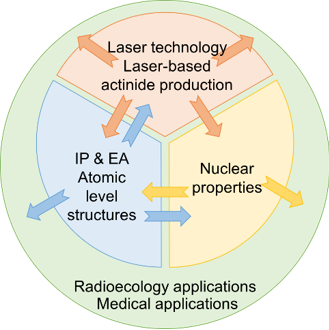
The LISA (Laser Ionisation and Spectroscopy of Actinides) consortium aims to train a new generation of experts in radioactive ion beam research and applications, laser spectroscopy, scientific laser technologies and atomic theorists whilst they work towards the goal of vastly improving our understanding of the atomic and nuclear properties of the chemical elements known as the actinides (atomic number Z ≥ 89).
Whilst this research is an essential prerequisite for unraveling the structure of the super heavy elements at the end of Mendeleev’s table, the value of this activity extends far beyond the fields of fundamental atomic and nuclear physics.
In-depth knowledge of the nuclear properties of an isotope and the atomic properties of the element, is a precursor for understanding their practical applications and also crucial to their identification and handling. Immediate valorization of these findings will be sought out in the fields of radioecology and nuclear medicine.
The actinides offer some of the most exciting and challenging opportunities for multidisciplinary science: fundamental nuclear structure research, astrophysics, atomic physics, and chemistry, reminding us that applications are always derived from basic research. The actinides, in particular, have been highlighted as a key performance indicator within the nuclear fuel cycle and the precise determination of a sample composition can be used to identify its origin in so-called nuclear forensics.
Finally, they are essential in the field of innovative medical treatment and diagnosis using radioisotopes. The training of a new generation of multidisciplinary scientists & researchers in the LISA research fields is timely and of importance to address the societal questions related to nuclear decommissioning, the aftermath of nuclear incidents, the general need to monitor our environment, and the research for the treatment of cancer.

